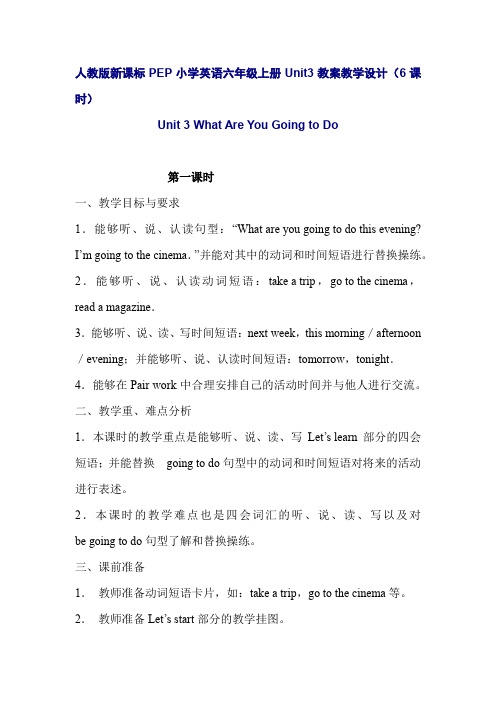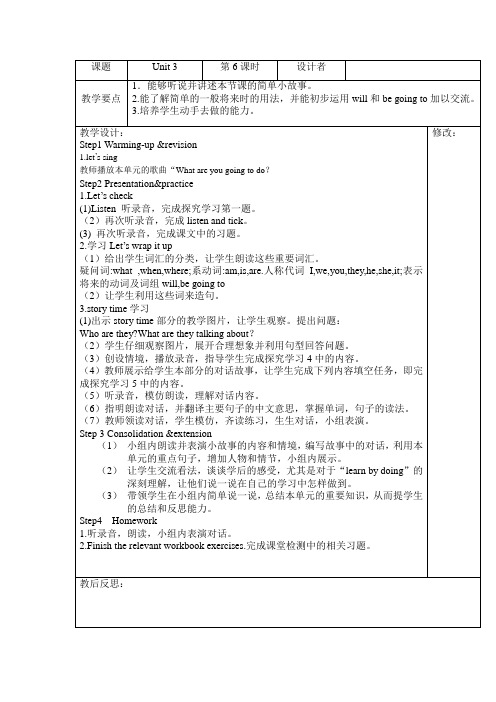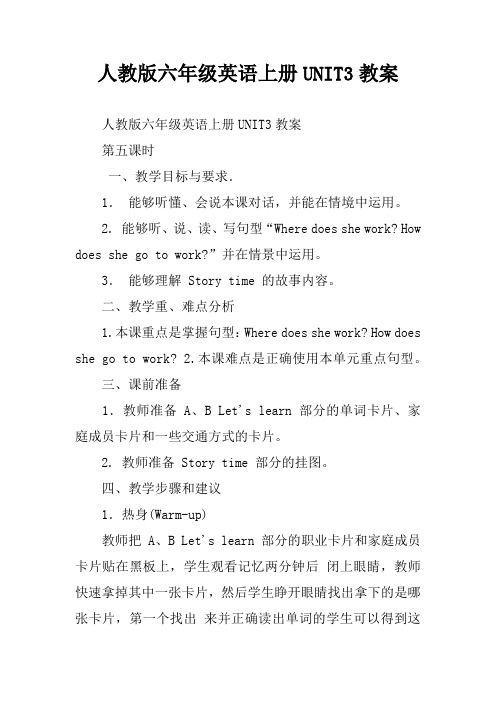小学英语人教PEP新版六年级上册Unit 3 表格教案(6课时)
- 格式:doc
- 大小:872.11 KB
- 文档页数:15

人教版新课标PEP小学英语六年级上册Unit3教案教学设计(6课时)Unit 3 What Are You Going to Do第一课时一、教学目标与要求1.能够听、说、认读句型:“What are you going to do this evening? I’m going to the cinema.”并能对其中的动词和时间短语进行替换操练。
2.能够听、说、认读动词短语:take a trip,go to the cinema,read a magazine.3.能够听、说、读、写时间短语:next week,this morning/afternoon /evening;并能够听、说、认读时间短语:tomorrow,tonight.4.能够在Pair work中合理安排自己的活动时间并与他人进行交流。
二、教学重、难点分析1.本课时的教学重点是能够听、说、读、写Let’s learn部分的四会短语;并能替换 going to do句型中的动词和时间短语对将来的活动进行表述。
2.本课时的教学难点也是四会词汇的听、说、读、写以及对be going to do句型了解和替换操练。
三、课前准备1.教师准备动词短语卡片,如:take a trip,go to the cinema等。
2.教师准备Let’s start部分的教学挂图。
3.教师准备录音机和本课时的录音带。
四、教学步骤和建议1.热身(Warm-up)(1)教师课前放本单元歌曲“What Are You Going to Do?”学生初步感知be to do句型。
(2)师生进行日常会话,可将重点放在动词短语的问答上,如:丁:What day is it today ?S:It’s Tuesday .丁:What day is it tomorrow ?S:It’s Wednesday .丁:What do you usually do On Wednesdays/in the evening?S:I usually read books.…2.预习(Preview)(1)教师出示课前准备好的课程表,说“Look! We have so many classes in a指着Monday说:“What classes do we have on Mondays?’’帮助学生一起说“On Mondays,we have English,Chinese,math.…”再请学生回答其他几个的课安排。




人教新版PEP英语六年级(上册)整册表格教学案一、教学目标•能够读懂并正确使用人教新版PEP英语六年级(上册)教材中的表格•掌握表格中的基本信息提取、对比和整理的能力•能够用英语描述表格中的信息•培养学生观察、分析和总结的能力二、教学内容•本次教学将以人教新版PEP英语六年级(上册)教材中的表格为主要教学内容。
三、教学步骤步骤一:导入1.利用图片或投影展示一张有关学生的生活习惯调查表格。
引导学生看图说话,描述表格中的内容。
示例对话:Teacher: Look at the picture. What can you see?Student 1: I can see a table.Student 2: There are some columns and rows.Teacher: Yes, it’s a table. What kind of information can you find in the table?Student 3: I can find the names of the students, the activities they like and the number of students who like each activity.……2.引导学生讨论表格中的信息,带出本节课的教学目标。
Teacher: What do you think is the purpose of this table?Student 4: I think it shows the students’ preferences for different activities.Teacher: That’s right! Today, we are going to learn how to read and use tables in English.步骤二:学习表格的基本结构和用法1.展示人教新版PEP英语六年级(上册)教材中的一个简单的表格,例如Unit 2中的。

人教版六年级英语上册UNIT3教案人教版六年级英语上册UNIT3教案第五课时一、教学目标与要求.1.能够听懂、会说本课对话,并能在情境中运用。
2. 能够听、说、读、写句型“Where does she work? How does she go to work?”并在情景中运用。
3.能够理解 Story time 的故事内容。
二、教学重、难点分析1.本课重点是掌握句型:Where does she work? How does she go to work?2.本课难点是正确使用本单元重点句型。
三、课前准备1.教师准备 A、B Let's learn 部分的单词卡片、家庭成员卡片和一些交通方式的卡片。
2. 教师准备 Story time 部分的挂图。
四、教学步骤和建议1.热身(Warm-up)教师把 A、B Let's learn 部分的职业卡片和家庭成员卡片贴在黑板上,学生观看记忆两分钟后闭上眼睛,教师快速拿掉其中一张卡片,然后学生睁开眼睛找出拿下的是哪张卡片,第一个找出来并正确读出单词的学生可以得到这张卡片。
2.预习(Preview)(1)教师放第一单元歌曲“How Do You Go to School?'’的录音,学生跟唱。
在热身活动中得到卡片的学生开始把卡片传给后面的同学,依次传递,歌曲结束时,得到卡片的学生用卡片上的单词说一个句子,如:…is a…(2)Let's try 学生打开学生用书第 62 页,教师放录音,学生听音、勾出正确的选项。
录音内容如下:Girl:What does your mother do?Boy:She is an engineer.Girl:Where does she work?Boy:She works in a shoe company.Girl:How does she go to work?Boy:She goes to work by subway.3.新课呈现(Presentation) Let's talk(1)教师说:“I go to school by subway.”在黑板上板书:subway,学生跟说,然后教师启发学生说出其它的交通方式,教师把学生想到的交通方式依次写在 subway 的下面。
新人教版(PEP)六年级上册英语《Unit3 My weekend plan》教案一. 教材分析《Unit 3 My weekend plan》是人教版(PEP)六年级上册英语第三单元的主题课文。
本节课主要让学生掌握一般将来时态,能够用英语描述自己的周末计划。
教材通过贴近学生生活的情境,引导学生学习、理解和运用语言,培养他们的语言运用能力。
二. 学情分析六年级的学生已经掌握了基本的英语语法知识和一定的词汇量,具备一定的听、说、读、写能力。
但学生在语言运用方面还存在一定的困难,特别是在口语表达和句子结构方面。
因此,在教学过程中,教师需要关注学生的个体差异,因材施教,充分调动学生的积极性,激发他们的学习兴趣。
三. 教学目标1.知识目标:–能够听、说、读、写一般将来时态的句子。
–掌握描述周末计划的相关词汇和表达方式。
2.能力目标:–能够用英语简单描述自己的周末计划。
–提高学生的听说能力和语言运用能力。
3.情感目标:–培养学生热爱生活、珍惜时间的积极情感。
–增强学生之间的人际交往和合作能力。
四. 教学重难点•一般将来时态的句子结构。
•描述周末计划的相关词汇和表达方式。
•一般将来时态的运用。
•句子结构的灵活运用。
五. 教学方法1.情境教学法:通过设定生活情境,让学生在实际语境中学习和运用语言。
2.交际教学法:引导学生进行小组合作、角色扮演等互动活动,提高学生的语言运用能力。
3.任务型教学法:设计具有实际意义的学习任务,让学生在完成任务的过程中学习和运用语言。
六. 教学准备1.教材、课件和教学资源。
2.教学卡片、图片等辅助教具。
3.录音机、投影仪等教学设备。
七. 教学过程1.导入(5分钟)–教师通过提问方式引导学生谈论自己的周末计划,激发学生的学习兴趣。
–学生分享自己的周末计划,教师给予鼓励和反馈。
2.呈现(10分钟)–教师展示本节课的主题和目标,引导学生关注一般将来时态。
–通过图片、卡片等辅助教具,呈现描述周末计划的相关词汇和表达方式。
人教版小学六年级英语上册英语教案Unit 3 My weekend plan第一课时Part A Let’s try Part A Let’s talk教学目标:1.能够听、说、认读句型:What are you going to do tomorrow? I’mgoing to have an art lesson.. I have to do my homework now.2.能够运用句型讨论自己的活动计划。
3.能够用正确的语音、语调朗读对话,并能进行角色扮演。
4.能够合理计划自己的活动。
教学重点:听、说、认读句型?What are you going to do tomorrow? I’m going to have an art lesson. I have to do my homework now .教学难点:运用句型讨论自己的活动计划。
教学过程:Step 1 Warm-upFree talkT:What do you often do on the weekend?S:I often ...T:What are you going to do this weekend? 引出本单元的话题My weekend plan。
Step 2 Presentation1.Let’s try(1)听录音,完成选择题。
(2)教师检查答案。
2.New sentence learning(1)What is Sarah going to do? She is going to...(2)讲解:be going to 的意思是“打算做什么事情”。
3.Let’s talk(1)听录音,回答问题。
a.What is Sarah going to do tomorrow?b.What is Mike going to do tomorrow?(2)再次听录音,学生跟读。
(3)角色扮演,练习对话。
Step 3 Cosolidation and extension情景设计:It’s Friday ,you are talking the weekend plan with your friend.1.教师请一名学生与之进行示范表演,要求用上短语:goice-skating,wash clothes...2.与搭档进行对话练习。
人教PEP版六年级英语上册Unit 3 教案第一课时课时内容A Let’s learn;Listen, answer and write课时分析本课时是人教版六年级上册第三单元第一课时。
围绕Chen Jie’s weekend plan这一话题展开,主要通过对话学习词组visit my grandparents, see a film, take a trip, go to the supermarket, this morning, this afternoon, this evening, tonight, tomorrow, next week及句型What are you going to do ...? I’m going to...的表达。
持续培养学生学习英语的兴趣,激发学生学习英语的热情,树立学好英语的自信。
第一课时是本单元的基础,学会了本课时所要掌握的知识,为学习其他课时做好铺垫。
本课时的重点是词组的掌握以及能够运用核心句型谈论周末计划。
本课时包括Let’s learn 和Make a plan 两个版块。
Let’s learn通过Sarah和陈杰对话的情景,呈现单词和词组的词形和意义。
此版块呈现的对话情境是Sarah和陈杰谈论陈杰的周末计划,自然的引出“你打算去干什么?我打算……”的句型。
谈论周末是学生们感兴趣的话题,很贴近学生的生活,也更能激发学生学习的兴趣。
Make a plan版块是一个综合性的语用活动,可以通过本活动结合自己的实际情况,巩固A Let’s learn所学的词汇和句型。
本课时的单词和词组visit grandparents, see, take, next week, morning, afternoon, evening, tomorrow,虽然没有集中涉及过,但是学生曾经学生,有一定的基础。
在设计教学过程时,先用游戏、简笔画猜一猜的活动激活旧知,然后结合教材设置的情境学习新知,运用听、说、读、写、玩等多种教学手段帮助学生理解和巩固所学新知,全面调动学生的积极参与,让学生在快乐的氛围中学会知识。
小学英语人教PEP新版六年级上册教材内容Unit 3 My weekend plan 上课时间总课时 6第1 课时教学要求1.学生能够听、说、认读句型:What are you going to do tomorrow? I’m going to have an art lesson. I have to do my homework now.2. 学生能够运用句型讨论自己的活动计划:What are you going to do tomorrow? I’m going to3. 学生能够用正确的语音、语调朗读对话,并能进行角色表演4. 学生能够合理计划自己的活动。
重点难点重点:学生能够听、说、认读句型:What are you going to do tomorrow?I’m going to have an art lesson.I have to do my homework now.难点:能够运用句型讨论自己的活动计划教学媒体Pictures, CAI, 设计者教学设想施教者修改或点评Step One: warming up and revisionFree talks:What do you often do on the weekend?I often…What are you going to do this weekend?如果有学生回答,那么引出本单元的话题My weekend plan.Step Two: Presentation1. Let’s try(1)T: It’s Saturday morning. Sarah in on the phone with Mike. Listen and circle the right answer.(2) Check the answers.2. New sentence learning(1) What is Sarah going to do?She is going to…(2) 讲解:be going to 的意识是“打算做什么事情”(3) I have 5 weekend activities: go ice-skating; wash clothes; draw pictures; make a snowman; go for a picnic. Whichactivity do you like? Please answer my question:T:What are you going to do this weekend?S: I’m going to…3. Let’s talk(1) T: Mike is on the phone with Sarah now. Watch the video and answer the questions:a. What is Sarah going to do tomorrow?b.What is Mike going to do tomorrow?(2)Watch it again and fill in the blanksa. Sarah and her classmates are going to _____________ in Renmin Park.b. Mike have to ________now.(3) Read the dialogue after the tape.(4) Let’s act as Mike and Sarah.Step Three: Consolidation and extension1. 情境设计:It’s Friday. You are talking the weekend plan with your friend.(1) A demo with a studentWhat are you going to do this weekend/tomorrow?I’m going to…What about you?(Let’s …together.)(2) Practise with the partner(3) Feedback2. Talk about our classmates weekend plan根据刚才同学们的反馈信息,进行提问What is… going to do?What are…going to do?3. Le t’s wrap it up 语法小结(1) Be going to 表达的意思“打算要做的事情”(2) Be 动词的用法复习What ____ Sarah going to do? _____ _____ going to play the piano.What ______ John and Mike going to do? _______ ______ ______ to do homework.Step Four: Assessment and homework1.Do the exercises on the AB.2.Homework:板书设计:Unit 3 My Weekend Plan What are you going to do tomorrow? I’m going to have an art lesson.What ___ _____ going to do?He/She is going toWe/They are going to作业设计:教学反思:教材内容Unit 3 My weekend plan 上课时间总课时 6第2 课时教学要求1. 学生能够听、说、读、写本课核心词组:visit my grandparents, see a film, take a trip, go to the supermarket2. 学生能够运用核心句型What are you going to do today? I’m going to see a film.在真实的情境中进行交流周末计划。
3.学生能够合理安排和计划自己的周末生活。
重点难点重点:三个四会词组和两个句型。
难点:能够合理和科学地安排自己的周末生活教学媒体Pictures,CAI,设计者教学设想施教者修改或点评Step One: warming up and revision1.Sing a song together: What are you going to do?2.Free talk: What are you going to do tomorrow?I’m going to…Step Two: Presentation and practice1.Present “ this morning, this afternoon, this evening”(1)What are you going to do this morning/ this afternoon/evening?S: I’m going to…(2)Make the students understand the meaning.(3)Write the words on the board, and spell the words.2.Present “tonight”(1)I’m going to read a book tonight. What are you going to dotonight?(2)Understand the meaning: 通过日期和实践的选择让他们明白意思。
(3)Write the work on the board.3.Ask the sentence What are you going to do _______? I’mgoing to _______.在课件中给出单词银行,让学生进行句型操练。
(1)Read the words or phrases in the word bank.(2)Practice in pairs.(3)Feedback.4.Sarah and Chen are talking about their plan, too. Let’slisten and answer.(1)What is Chen Jie going to do today?She is going to see a film.Choose the picture of “ see a film”Learn to say.Write it on the board.(2)What is she going to do next week?She is going to __________. ( take a trip)Choose the right picture of “take a trip”Read it and write it on the board.(3)What is Sarah going to do this afternoon?She is going to ________.( the supermarket)go to the supermarket------ be going to the supermarketSpell the word and write it on the board.(4)What is she going to do tomorrow?She is going to visit her grandparentsWrite the words on the board.5. Read the new words after the tape.Step Three: Cosolidation and extension1. A task: It’s Saturday morning now. Two girls are asking the planLet’s help them make a plan.(1)Fill in when and what?(2)Talk about the weekend planWhen What are you going to do?this morningthis afternoonthis eveningtonighttomorrow2. Do the exercises on the AB.板书设计:What are you going to do …?I’m going to …see a filmtake a tripgo to the supermarketvisit grandparents作业设计:教学反思:教材内容Unit 3 My weekend plan 上课时间总课时 6第3 课时教学要求1.学生能够听、说、认读句型:Where are you going? We’re going to… When are you going? We’re going to… We’re going to seea film about space travel.2. 学生能够运用句型What are you going to do? Where are you going? When are you going?进行某项活动计划的讨论。